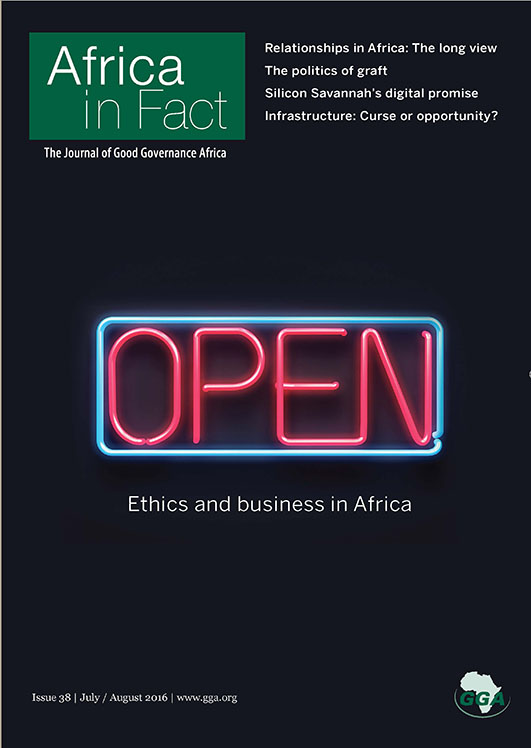
In Africa, doing good business is being good business
Welcome to Issue 38 of Africa in Fact, “Ethics and doing business in Africa”. This issue ushers in some significant changes and innovations at Good Governance Africa (GGA). First and foremost, on behalf of the GGA team, it is my great pleasure to introduce Lloyd Coutts, our new head of Publications, to our community of readers. With his impressive career as a “dyed-in-the-wool” journalist and given his editorial track-record, Lloyd brings strengths to the helm in both print and digital media and we look forward to taking our journey to the next level.
In line with our editorial changeover, and based on the positive feedback received on the hefty content of Issue 36 (Local Government), we are shifting to a more substantial, quarterly offering of Africa in Fact. The rationale for this move is to bring you a more thorough mix of breaking news, analysis and cross over content. This expansive approach in turn enables us to better engage themes of interest and provide you with more governance-related, fact-based knowledge. Please watch this space over the coming months for developments pertaining to our digital and print media and to our newly designed website.
At GGA, we argue that the activity of “doing business” on the continent presupposes the notion of “being business in Africa”. The first element of our name, “Good” Governance Africa, makes explicit that we contextualise the articles that follow and any of our engagements surrounding governance within a rigorous ethical framework. To us, “being business” here in Africa means “being ethical”, in right relationships, and that good morals represent the scaffolding upon which to build any enduring enterprise or successful endeavour.
Framed as such we can engage William Gumede’s penetrating analysis of corruption on the continent, which simultaneously locates this phenomenon within the ambit of the more complex reality and imparts some helpful remedies. Alternatively, we can ruminate on Ola Bello’s artful engagement with the buzzword of corruption, as recently hotmiked in David Cameron’s comments to Queen Elizabeth, or consider the inspiring innovations in Kenya which, among other states, is abounding with exciting ICT initiatives.
Africa in Fact never shies away from bringing you the governance story— good, bad or otherwise. It is in the spirit of this tradition that we engage the current topic of doing business here, warts and all. So it is that we present perceptions of South African expansionism into the continent and the elephant in the room, namely the attitude that “Africa is not for sissies”.
While one cannot deny the fact that doing business in Africa is hard, our writers assert that from the Cape to Cairo, and Kinshasa to Kigali, a lot more nuance and finesse is involved. A hard hitting, heavy-handed approach misses the regional and local subtleties involved.
Meanwhile, of course, the usual suspects are at play. In the DRC, political instability does little to inspire growth and development. On either side of the Limpopo, political elitism shows itself as the prime beneficiary of economic nationalism. While on the upside, a little political will can go a long, long way in reducing corruption and mismanagement, as the Seychelles and Rwanda demonstrate.
The phrase on everyone’s mouth remains: “Infrastructure, infrastructure, infrastructure”. As necessary as investment is in order to spark and sustain progress, it proves mightily difficult to encourage this in a context within which commodity prices are tumbling downwards and confidence is substituted with suspicion. State supression of democratic freedoms, of the press and of expression, does little to inspire while the angst of “state capture” hangs in the air.
At a time when major challenges such as unemployment present themselves, Alfred Mthimkhulu, GGA’s head of research, reminds us that we need to pay attention to the data, since the information available reinforces the need for large-scale and labour-intensive infrastructural development initiatives. Billions of dollars need to be spent within the coming years to level the playing field.
Africa is Open, as the funky neon sign on our cover illustrates. Open for relationship, open for the good, open for business, innovation and infrastructural development, and open to pursuing transparent and accountable governance. Africa is open to itself and to others, but on Africa’s terms.
James Brown, the legendary star of the show at the Soul Power music festival in Kinshasa, 1974, shared some prophetic words: “It’s been a long time coming, and these are four things I’d like to leave you with, four small things: it’s cold-blooded, but it’s been hell, now here’s the payback and remember, as long as you live, Papa don’t take no mess.”
We’ve had our time of cold-blooded plunder, it has been hell, and continues to be, wherever bad governance prevails. But the seasons are changing and Africa is ripe for return and restoration. Perhaps unsurprisingly, it was at that show and in the current-day DRC, ahead of his “Rumble in the Jungle” with George Foreman that the now late, great Muhammad Ali quipped: “I’ve never felt so free in my life”.
Prophetic words. With freedom comes the soul power of responsibility, and Africa’s done messing around.



